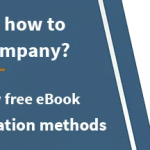For many business owners, one of the most important decisions that they will make is the decision to sell their company. A business is often the fruit of many years of hard work, establishing relationships and facing numerous challenges and leaving something behind that has been a significant part of a person’s or a family’s life for many years or even generations can be extremely difficult.
However, selling a business does not necessarily mean that the seller will need to completely leave his or her business behind. Depending on how the terms of a sale are negotiated, a business owner may continue to play an important role in a company even after it is sold, something that may be positive for business buyers as well as sellers.
Selling a business does not necessarily mean that a seller will need to completely leave his or her business behind.
Why Selling a Business Can Be Hard
There are often four reasons why selling a business can be difficult for business owners.
Concern for Firm Employees. Businesses are important sources of material wellbeing for firm employees and business owners are often concerned that, if the business is sold, these employees will lose their jobs and be left in difficult economic positions.
Concern for Clients. Many business owners have close commercial and personal relationships with clients and these clients depend on a business’ products and services. Business owners are often concerned that, if the business is sold, the quality of products and services that are sold to clients will decline, which will negatively affect clients who may have a relationship with a business for many years.
Concern about Economic Alternatives. Businesses represent a financial return for business owners based on their investment in the company. Particularly for successful businesses that provide excellent returns, business owners are often concerned that they will not be able to invest the proceeds from the sale of a company in a new business activity that will provide the same level of financial returns.
Concern About Life After the Firm. More than simply a job or source of income, for many business owners a business represents an activity that occupies the vast majority of their time. This activity often involves many professional and personal relationships with co-workers, clients and service providers and it can be very difficult to accept that from one day to the next, a life that was filled with meaningful commercial relationships, obligations and timetables will be replaced with a large professional vacuum.
Company Sale and Value Loss
Apart from concerns a business owner may have about selling a business, it is often the case that the clean break of an owner from a business will not be in the best interests of the business or the buyer.
There are two key reasons for this. The first reason is that the incoming buyer may not be as familiar with the business or local market as the seller and thus a simple handoff of the business to the incoming party may result in a significant drop in business efficiency, revenue generating power and risk management capability.
Second, an abrupt sale may cause the defection of valuable employees or clients, which can lead to great losses of business value.
Creative Win-Win Company Sale Options
Given the concerns many business owners have about selling their businesses and business problems that can result from abrupt business sales, one option to consider is a business model sale which allows the owner to remain significantly involved in a business after it is sold.
Three ways in which a business owner can remain involved in a business after it is sold is through a share sell down, a directorship role and as an outside advisor to the business.
The Share Sell Down. One approach for business owners to remain involved in a business after they sell is, instead of selling the whole company at once, to provide a structured sale of shares over an agreed period of time, such as a year, three years or five years. This approach can allow the business owner to remain significantly involved in the business and also allow the new buyer the time to acquire necessary business know-how and step into the business operating relationship in a way that does not cause operating disruptions or business value to be lost. In some share sell down structures, the owner may retain a minority interest in the business so that he or she continues to have an economic interest in the business indefinitely into the future.
Directorship. Even if a business owner sells its entire stake in a business, the business owner may participate as a non-voting director in the company to continue to remain actively involved in company affairs. This role could be combined with working on a firm project where the business owner has particular expertise, something that could create economic benefits that could be shared by the parties.
Outside Advisor. A third approach for a business owner to remain involved in a firm after it is sold is as an outside advisor where the business owner advises the firm on different matters relevant to the business depending on the nature of the business and the business owner’s strengths and interests.
Conclusion
Selling a company is a major professional as well as personal decision for many company owners. In addition to challenges for owners, the complete sale of a company can also create significant issues for incoming buyers. These issues may lead to buyers offering lower purchase prices for a company due to concerns that business value may drop after a business owner leaves or that business forecasts made based on the strengths of the outgoing owner that served as the basis for a company valuation will not be able to be met.
One solution to this is to use a company sale structure that allow owners to remain involved in a business after it closes. While the feasibility of this approach depends on what the company purchase and sale motivations are, it can often smooth the sale process position for both parties.
This article was written by Darin Bifani. If you would like to know more about how to sell your company, take a look at VALUE, WORTH, AND COMPANY SALE STRATEGY.
The photo for this article was taken by Ahmed Saffu on Unsplash.




